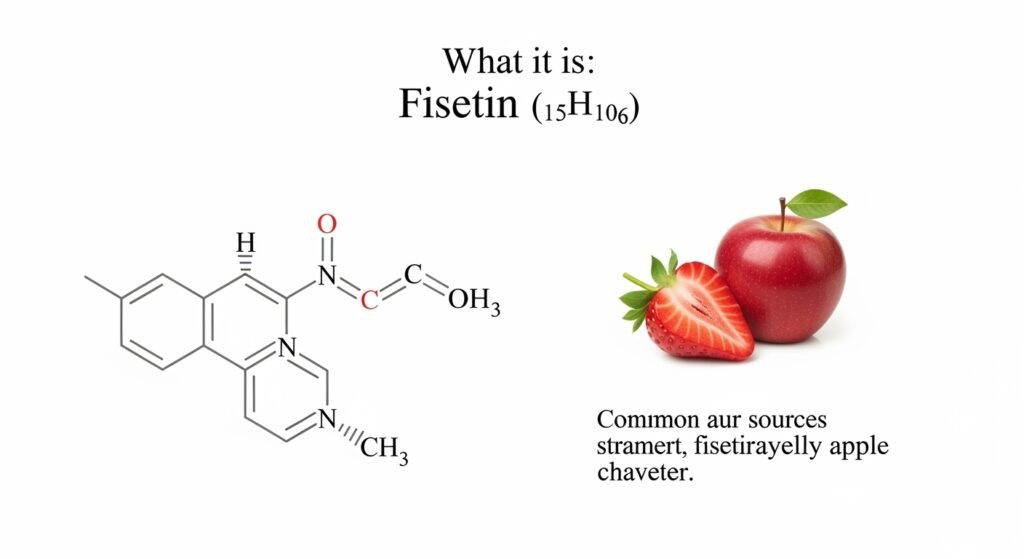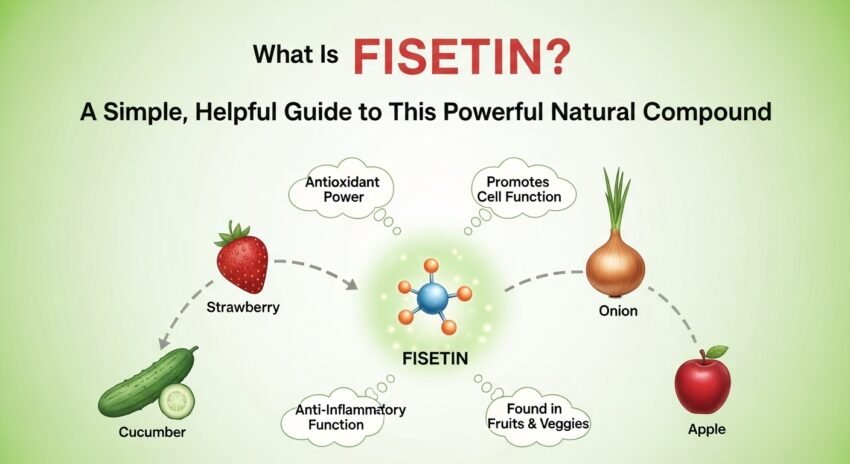Table of Contents
Have you ever heard about fisetin and wondered what it actually does? You’re not alone! Fisetin is a natural substance found in many fruits and vegetables, like strawberries, apples, onions, and cucumbers. Even though it’s been around in nature forever, scientists are just beginning to discover how amazing it really is for your health. People are now talking about fisetin because it may help fight aging, protect the brain, and keep your body strong. Some even call it a senolytic compound, which means it may help clear out old, damaged cells from the body. Sounds cool, right? But there’s a lot more to learn. In this article, we’ll explain exactly what fisetin is, what it does, and how it might help you live a longer, healthier life. We’ll keep things very simple and easy to understand, so even if you’re not a science expert, you’ll still get the full picture.
What Is Fisetin?
Fisetin is a natural chemical called a flavonoid, which comes from plants. Flavonoids give fruits and veggies their bright colors and health benefits. Fisetin is especially known for being anti-inflammatory and antioxidant, which means it helps protect your body from damage. When we eat foods with fisetin, it may help lower stress inside our cells. Our bodies already have natural defenses, but fisetin adds extra support. It’s like giving your body a superhero shield. While fisetin is found in many common foods, you’d have to eat a whole lot to get a big dose. That’s why some people take fisetin as a supplement.
Which Foods Contain Fisetin?
You might already be eating fisetin-rich foods without even knowing it. The top source of fisetin is strawberries. In fact, strawberries have more fisetin than any other fruit—about 160 micrograms per gram. Other fruits and vegetables with smaller amounts include:
- Apples
- Grapes
- Onions
- Cucumbers
- Peaches
- Tomatoes
Eating these foods every day can provide small amounts of fisetin naturally. But if you’re looking to get the full benefit, especially for anti-aging or brain health, you might want to look into supplements, since it’s hard to eat enough to equal the higher dosages used in research.
Fisetin and Anti-Aging Benefits
One of the most exciting topics around fisetin is its anti-aging power. As we get older, our bodies build up something called senescent cells, or “zombie cells.” These cells stop working, but they don’t die—they just hang around and cause trouble. Scientists believe these zombie cells make us feel older and contribute to health issues. Fisetin may help by acting as a senolytic, which means it helps remove old cells that aren’t helpful anymore. This could make you feel more energetic and improve how your body works over time. Although research is still ongoing, early studies in mice have shown very promising results on lifespan and healthy aging.
Fisetin and Brain Health
Fisetin may also be good for your brain. Studies suggest that it can protect brain cells from damage and support better memory and learning. As we age, our brains can lose some of their sharpness. This is partly due to inflammation and oxidative stress. Fisetin helps reduce both. Some researchers believe it could even protect against serious brain diseases like Alzheimer’s, although more human studies are needed. In some mice studies, fisetin improved memory and reduced brain inflammation, especially in older animals. So, while fisetin isn’t a cure, it might be a helpful tool for keeping your mind active and healthy as the years go by.
Fisetin for Inflammation and Immune Support
Another great benefit of fisetin is its anti-inflammatory powers. Inflammation is your body’s way of fighting sickness or injury. But too much inflammation, especially if it sticks around too long, can lead to problems like joint pain, fatigue, and even heart disease. Fisetin may help by calming down this overactive response. It blocks certain chemicals in your body that cause long-lasting inflammation. That means it may also support a healthier immune system. If your body is less stressed or inflamed, it may be better at fighting off colds, infections, or serious conditions over time.
Fisetin and Heart Health

Your heart works hard every day, so keeping it healthy is super important. Some early studies show that fisetin may help by improving blood flow and lowering inflammation in blood vessels. Since fisetin has antioxidant effects, it can protect your heart cells from damage caused by free radicals—those tiny harmful particles created by stress, junk food, or pollution. It may also help reduce bad cholesterol levels, though more studies are needed in humans to confirm that. Adding fisetin-rich foods or supplements to a heart-smart routine could offer extra support and protection for your circulatory system.
Fisetin for Skin and Beauty
Fisetin might also help you glow from the inside out. Since it helps lower inflammation and boost antioxidants, it could support clearer skin, slow down wrinkles, and protect against sun damage. Some users believe that adding fisetin to their routine makes their skin look better and feel firmer. Although it’s not a beauty product on its own, fisetin may work behind the scenes to fight aging, stress, and cell damage related to how we look. When your body feels better overall, your skin often shows it too. That’s why fisetin is starting to appear in some anti-aging beauty supplements.
How Fisetin Is Different from Other Flavonoids
There are many flavonoids, like quercetin, resveratrol, and curcumin. While they all have health benefits, fisetin stands out because it may offer stronger senolytic effects. Unlike some other flavonoids, fisetin targets and removes old, worn-out cells more directly. This makes it a unique tool in the world of supplements. It does share some overlapping benefits, like lowering inflammation and protecting the brain. But fisetin may work more efficiently when it comes to anti-aging and cellular repair. In the future, we may even see it combined with other flavonoids to create even stronger health supplements.
Are There Any Side Effects of Fisetin?
Fisetin is natural and found in many foods, so for most people, it’s very safe. No serious side effects have been reported in the studies available so far. However, fisetin supplements often come in stronger doses than you’d get from food. Always start with a lower dose and talk to your doctor if you’re taking other medications or have any long-term health problems. Some people report mild side effects, like stomach aches or tiredness, but these are rare. It’s best to listen to your body and stop using it if you notice anything unusual.
How to Take Fisetin Supplements
If you choose to take fisetin as a supplement, it usually comes in capsule form. Dosages vary, but most supplements offer between 100 mg and 500 mg per serving. Some people follow protocols where they take fisetin once a week or for a few days per month as a “senolytic is a scheduling approach.” Others take it daily in smaller doses. It’s a good idea to pick a brand that’s tested for purity and contains no harmful fillers or additives. You can often find combined formulas with quercetin, resveratrol, or NMN (nicotinamide mononucleotide) for extra benefit.
What Does the Research Say About Fisetin?
Much of the research on fisetin is still in early stages, especially in human studies. Most of what scientists know comes from animal research or tests on human cells in labs. So far, results look very promising. In one mouse study, fisetin extended lifespan and improved healthspan, meaning the animals not only lived longer but also lived better. Other studies showed improved brain function, reduced inflammation, and better blood sugar control. However, scientists say we need more human studies to know exactly how it works and who will benefit most. Experts are excited, but they still recommend caution.
Combining Fisetin with a Healthy Lifestyle
Fisetin won’t replace a healthy diet, good sleep, or exercise—but it could add to your wellness toolkit. If you eat lots of fruits and vegetables, stay active, avoid smoking, and get good rest, you’re already helping your body stay strong. Adding fisetin through food or supplements may give helpful extra support, especially for brain, heart, or anti-aging goals. It’s not about doing one big thing—it’s about making many small, smart choices. Each one makes your body stronger and better at handling the challenges of life. Start simple, and build from there.
FAQs
1. What is fisetin good for?
Fisetin is good for reducing inflammation, protecting brain cells, supporting the heart, and helping fight signs of aging.
2. Is fisetin safe to take every day?
Most people tolerate it well, especially when taken at recommended doses. Talk to your doctor before starting any supplement.
3. Can fisetin help with memory or brain fog?
Studies show fisetin may improve memory and protect the brain, but more research in humans is still needed.
4. Are there side effects from fisetin?
Fisetin is usually safe. Some rare side effects may include mild stomach upset or fatigue in sensitive individuals.
5. What foods have fisetin?
Strawberries have the most fisetin, but you can also find small amounts in apples, grapes, onions, and cucumbers.
6. Can children or seniors take fisetin supplements?
There’s not enough research in specific age groups yet, so always talk to a healthcare provider before giving it to children or older adults.
Final Thoughts
Fisetin may be a small word, but it packs some serious power. It’s a plant-based compound with the potential to help us age more gracefully, think more clearly, and feel better overall. While no supplement can replace healthy habits, fisetin looks like a promising helper for anyone looking to support their body and brain. It’s easy to try through food, and if you’re thinking about supplements, just make sure to check with your doctor first. The best results come when science meets smart choices—and others are starting to see fisetin as part of the future of wellness. So, are you ready to give this natural powerhouse a closer look?
